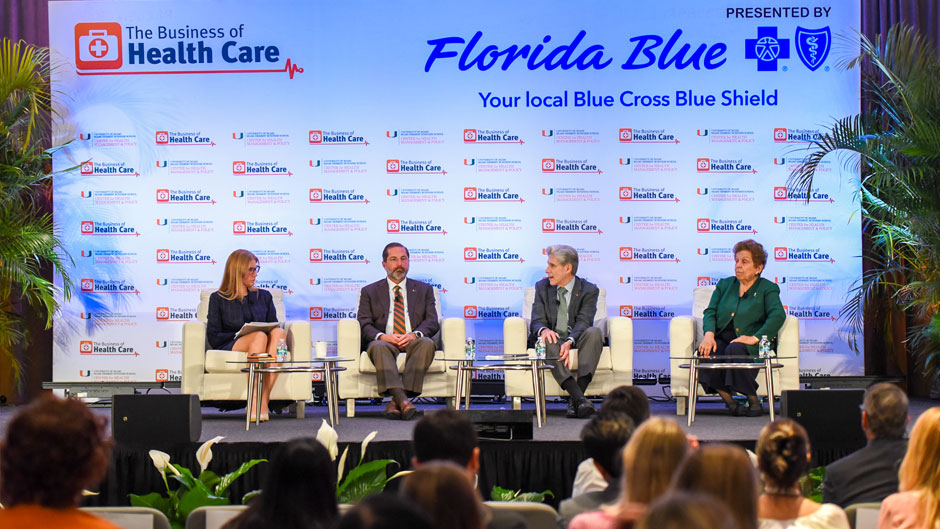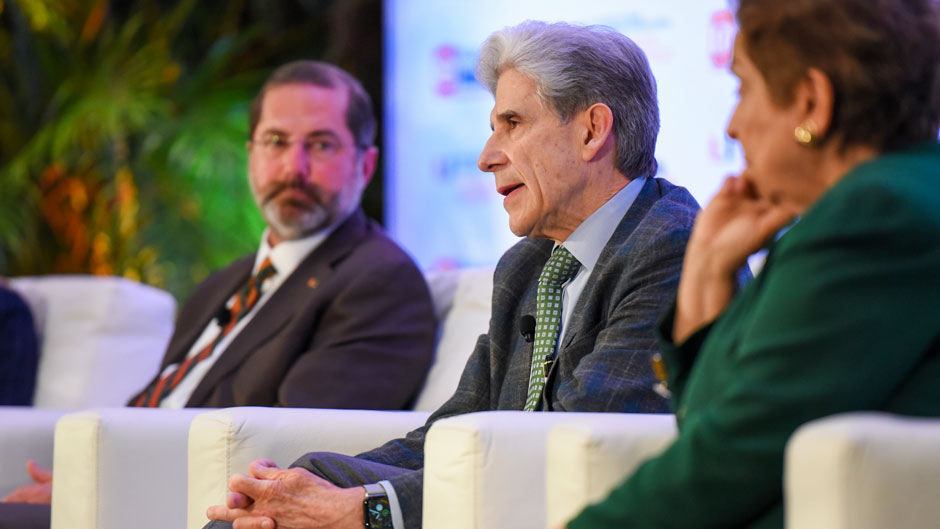With an aim to generate ideas to redirect the health care system—one of the industries most disrupted by the pandemic—specialists representing nearly every sector of the industry gathered for the full-day conference, themed “Managing Through Uncertainty” and hosted by the University of Miami Patti and Allan Herbert Business School.
The keynote panel for the Friday event on the Coral Gables Campus—the 2023 Business of Health Care Conference—featured three former health ministers who shared insights and recommendations for a potential road map for the industry facing monumental challenges. Multiple participants mentioned the fact that the public health emergency period, which allowed for special government interventions, is set to expire May 11.
The conversation with University President Julio Frenk, a former Mexican health minister, and Alex M. Azar II and Donna Shalala, both former U.S. Department of Health and Human Services secretaries and now members of the University’s business school faculty, was moderated by Karoline Mortensen, associate dean of business programs and professor of Health Management and Policy.

Karoline Mortensen, left, associate dean of business programs and professor of Health Management and Policy, moderated a panel that included health experts, from left, Alex Azar, Julio Frenk, and Donna Shalala.
Frenk highlighted that every pandemic in history—dating to the fourth century B.C. plague in Athens—has prompted uncertainty and a period of deep change that has persisted beyond the end of the the pandemic phase of a disease.
“We are very close to the end of the pandemic phase of COVID-19, though not the end of COVID, and are already seeing how that uncertainty is persisting,” he said.
To counter that uncertainty, and to address the tremendous changes that have occurred in both the health care system and in higher education, Frenk urged the need to embrace a new paradigm, one that integrates a broader vision for education.
His vision would include expanding competencies, such as crosscutting integrated critical thinking; the ability to reason ethically; and enhanced oral, written, and visual communication. Frenk also encouraged forging more transprofessional or hybrid professions—doctor/engineers, nurses/engineers, doctor/computer scientists, etc.—and increased bilingualism in the health care workforce.
“It’s a brave new world, and the university that has the ecosystem that embraces that new reality will have a very exciting time ahead. And those who do not will join Jurassic Park,” Frenk said.
Azar, who as health secretary was instrumental in forging public and private partnerships under “Operation Warp Speed” that helped speed the development of the COVID-19 vaccine, emphasized the biopharmaceutical companies’ capacity for the research and development of vaccines.
“The last 20 years have been a phoenix of resurgence, and it’s now one of the strongest parts of the biopharmaceutical companies, whether it’s the shingles, meningitis, or HPV (Human papillomavirus) vaccines—just go through the list. It’s one of the strongest parts of the industry,” Azar pointed out.
Shalala highlighted that the regulatory framework for the health industry, which sets standards for training and practice and is controlled principally by state governments, became more flexible during the pandemic.
In noting the critical nursing shortage, Shalala pointed out that as many as 30,000 nurses are waiting for interviews to be completed so they might enter the workforce.
“The states have enormous amounts of power on how the practice exists because they regulate licensures and create boundaries,” Shalala said. “If we want to get the flow [workforce flow of health professionals into the field] that we want and train people for this ‘brave new world’ we have to look at the regulatory framework.”
Despite the triumph of science in forging a vaccine that saved millions of lives, the three former ministers all identified the erosion in the trust of science and the polarization of health issues as a critical concern.
“What distressed me most was this false dilemma between civil liberties and public health action—that’s a false dilemma,” said Frenk.
Azar called the increase in mistrust, most evident across party lines, a cultural challenge. “It’s a trust issue and a deep cultural phenomenon that goes beyond information,” said Azar. “There’s a different language being spoken right now that has eroded the capacity for trust.”
In the first panel of the day, “A View From the Field,” Patrick Geraghty, president and CEO of GuideWell and Florida Blue, facilitated a robust conversation that captured perspectives from leaders representing the National Medical Association, America’s Health Insurance Plans, Healthcare Financial Management Association, Medical Group Management Association, American Nurses Association, American Hospital Association, and the Pharmaceutical Research and Manufacturers of America.
In response to the request for principal lessons learned from the pandemic, panelists noted the importance of education, the increase in the mistrust of science, the need for new business models, the realization that “the people that work for hospitals will show up for their communities,” and that inequities in the workforce and in the audiences served—that were evident before the pandemic—became more pronounced, among other answers.
Steven Ullmann, professor and director of the Center for Health Management and Policy for the business school, provided the welcome and closing remarks for the conference.
Ullman marked the importance of convening leaders and specialists across all the major industry sectors.
“Bringing everyone together means we’re able to focus a multidimensional lens on the pivotal uncertainties, and that’s critical to generating remedies,” Ullman said.

